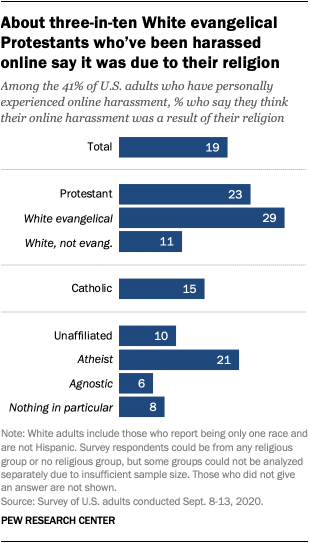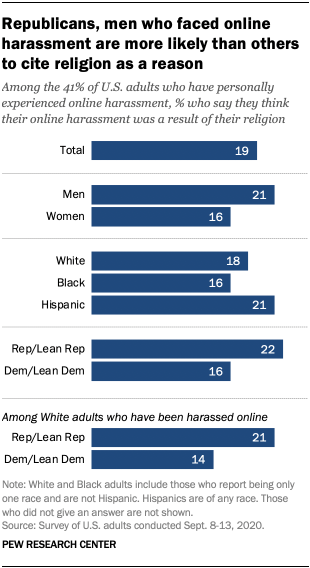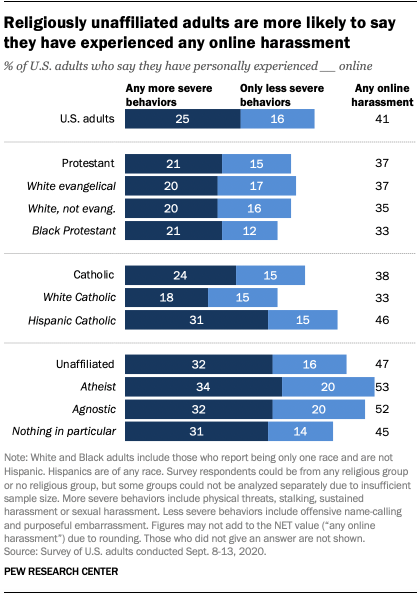Some 41% of U.S. adults have been harassed online in at least one of six ways covered in a Pew Research Center survey conducted in September 2020. Those who have been subjected to these experiences cite a number of reasons for why they were targeted, and a notable share believe that the harassment they faced was due to their religious affiliation.
About one-fifth of those Americans who have personally experienced online harassment (19%) say they believe they were targeted because of their religion. When looking at Americans overall – not just those who’ve been harassed online – that share is equivalent to 8% of the overall population.
Overall, this represents a modest rise in those who believe they were the target of online harassment because of their religion since the Center last asked these questions in 2017. At that time, 12% of those who had experienced online harassment said they believed they were targeted because of their religion. That number was 5% of all adults.
In this research, adults were asked if they had experienced any of the following abusive behaviors online: physical threats, stalking, sustained harassment, sexual harassment, offensive name-calling or purposeful embarrassment. Those who had faced at least one of these problems were then asked why they thought they had been targeted.
Pew Research Center has a history of studying online harassment. This report focuses on American adults’ experiences and attitudes related to online harassment. For this analysis, we surveyed 10,093 U.S. adults from Sept. 8 to 13, 2020. Everyone who took part is a member of the Center’s American Trends Panel (ATP), an online survey panel that is recruited through national, random sampling of residential addresses. This way nearly all U.S. adults have a chance of selection. The survey is weighted to be representative of the U.S. adult population by gender, race, ethnicity, partisan affiliation, education and other categories. Read more about the ATP’s methodology. Here are the questions used for this report, along with responses, and its methodology.
This study shows there are some groups who are more likely to attribute their harassment to their religious beliefs than others. Of those who say they faced online abuse, 23% of Protestants say they believe they were the target of online harassment because of their religion, compared with 15% of Catholics and one-in-ten of those who are religiously unaffiliated.
Among Protestants, White evangelical online harassment targets (29%) are more likely than White non-evangelical targets (11%) to say they believe they were the target of harassment online because of their religion. There are also differences among those who describe themselves as having no religious affiliation. For instance, 21% of atheists who have been harassed say they were targeted with abuse online “as a result of their religion,” compared with smaller shares of targets who are agnostic (6%) or “nothing in particular” (8%). There are not enough respondents in the survey’s sample who are Black, Hispanic or Asian – or who are part of specific religious groups – to be broken out in a separate analysis for this question.
Other research has examined the online experiences of religious people. For instance, a 2014 survey by the Center found that one-in-five Americans share their faith online. Another study by the Cyberbullying Research Center found that notable portions of American teens have experienced cyberbullying because of their religion. Issues around online harassment have drawn the attention of the Inter-Parliamentary Task Force to Combat Online Antisemitism and the Vatican.
The Center’s recent survey findings suggest that men and Republicans who have experienced some form of harassment online are also more likely than their counterparts to say they believe their religion was a reason they experienced abuse online. For instance, 21% of men who have experienced online harassment say they believe their religion was the reason they were targeted, compared with 16% of women. Among adults who have been harassed, Republicans and independents who lean toward the Republican Party (22%) are more likely than Democrats and Democratic leaners (16%) to believe this is why they were targeted.
And while there were no significant differences on this question by race and ethnicity, White Republican targets are more likely to cite religion as the reason they believe they were targeted compared with White Democratic targets (21% vs. 14%).
In addition to asking about religion as a possible reason for harassment, the survey asked about four other possible reasons: a person’s political views, gender, racial or ethnic background and sexual orientation. Political views were the top reason cited for why people think they had experienced abuse – with half of adults who’ve experienced online harassment saying this was the reason they believe they experienced harassment online. There are no differences among Protestant, Catholic and religiously unaffiliated online harassment targets when it comes to saying they were harassed online because of their political views.
Even though those who are religiously unaffiliated are less likely to cite religion as a catalyst for their harassment online, larger shares of this group are likely to say they have experienced online harassment of some kind. However, much of this can be explained by the fact that younger Americans are more likely to be religiously unaffiliated and online harassment is more common among adults under the age of 30.
When it comes to experiencing abuse online, roughly half of adults who have no religious affiliation (47%) say they have experienced any form of online harassment, compared with about four-in-ten Americans who are Protestant or Catholic (37% and 38%, respectively).
Similarly, the religiously unaffiliated are more likely than Protestant or Catholic adults to say they have experienced any more severe harassing behaviors online, such as stalking, physical threats, sustained harassment or sexual harassment. Hispanic adults who are Catholic (31%) are also particularly likely to have experienced these more severe forms of harassment online.
These overall figures are in line with past Center surveys, which also found that religiously unaffiliated adults were more likely to say they had experienced any form of online harassment.
Note: Here are the questions used for this report, along with responses and its methodology.


